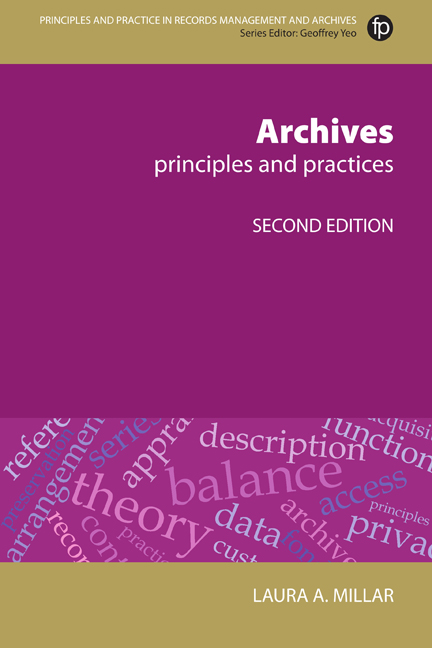Book contents
- Frontmatter
- Contents
- Figures and tables
- Foreword to the first edition
- Foreword to the second edition
- Acknowledgements
- Introduction to the second edition
- PART I ARCHIVAL PRINCIPLES
- 1 What are archives?
- 2 The nature of archives
- 3 Archival history and theory
- 4 The uses of archives
- 5 Types of archival institution
- 6 The principles of archival service
- 7 Balancing access and privacy
- PART II ARCHIVAL PRACTICES
- Conclusion
- To learn more
- Glossary of terms
- Index
- Miscellaneous Endmatter
6 - The principles of archival service
from PART I - ARCHIVAL PRINCIPLES
Published online by Cambridge University Press: 08 June 2018
- Frontmatter
- Contents
- Figures and tables
- Foreword to the first edition
- Foreword to the second edition
- Acknowledgements
- Introduction to the second edition
- PART I ARCHIVAL PRINCIPLES
- 1 What are archives?
- 2 The nature of archives
- 3 Archival history and theory
- 4 The uses of archives
- 5 Types of archival institution
- 6 The principles of archival service
- 7 Balancing access and privacy
- PART II ARCHIVAL PRACTICES
- Conclusion
- To learn more
- Glossary of terms
- Index
- Miscellaneous Endmatter
Summary
When a man assumes a public trust, he should consider himself as public property.
Thomas Jefferson (1743–1826) quoted in B.L. Rayner, Life of Jefferson, 1834While the nature of a particular archival institution will influence the nature and scope of its holdings and operations, the central principle of accountable and trustworthy archival service must be to make certain that archives are captured and protected with their evidential value intact, and then to ensure that those archives are made available as fully as possible, so that they may benefit the widest possible constituency. If archives are collected but stored away in the basement of the repository and never cleaned of dust, insects or mould, then they have not been protected for posterity. If they are acquired and preserved but never made available to anyone but the person who collected them, then they do not support a society's quest for evidence, information and knowledge.
The act of acquiring and preserving archives is a service that must be performed in an accountable and structured fashion, with respect not only for the documentary evidence itself but also for the individuals and groups who created that evidence and for the people who may wish to access that evidence now and in the future. To understand the nature of archival service, it is necessary to outline the core duties and skills of the archivist and then to examine a central challenge the archivist faces: balancing the rights of some to access and use archival materials for any manner of research with the rights of others to ensure their own personal information is protected from illegitimate use. This chapter looks at the principles that guide the work of the archivist in providing archival services to society. Chapter 7 is devoted to a discussion of the specific challenge of balancing access and privacy.
Archival obligations
Irrespective of the scope of the archival institution, the archivist working in that institution, or the archivist working as an independent consultant for a number of clients, has a responsibility to perform certain core duties. Her ultimate goal is to support the effective care of archival materials, so that they are preserved and managed as authentic and reliable documentary evidence and then available for the widest possible use. How does she do that?
Information
- Type
- Chapter
- Information
- ArchivesPrinciples and Practices, pp. 93 - 106Publisher: FacetPrint publication year: 2017
